Updated: 30th May, 2025

Explore the world of heat pumps as a green, efficient home heating solution. This blog guides you through types, costs, subsidies, and how to choose the right heat pump system for your home.
Try a new boiler quote, save up to £340 per year (0% APR available).
As homeowners seek more efficient and environmentally-friendly heating options for their homes, heat pumps have become an increasingly popular solution.
A heat pump transfers heat from one place to another, making it a versatile option for both heating and cooling a home.
However, many homeowners wonder whether heat pumps can effectively heat the entirety of their house or if they are only suitable for targeted or supplementary heating.
Heat pumps work by extracting heat energy from one source, such as the outside air, ground, or water, and then releasing it into your home.
This process can work in reverse during the summer months to help cool your home by extracting the heat from indoors, making heat pumps an excellent year-round solution.
While heat pumps are highly efficient, their effectiveness at providing whole-house heating may depend on various factors such as insulation, the size of the home, and climate conditions.
For more information on the heat pumps, check out our handy UK heat pump cost guide!
Get a quote in 60 seconds, fitted as fast as next day!
0% APR finance available.
Heat pumps are a versatile solution for both heating and cooling your home, providing an efficient and environmentally-friendly alternative to traditional heating methods like gas or oil.
They function by transferring heat between the inside and outside of your home, making use of the heat available in the air, even at low temperatures.
In the summer, a heat pump absorbs heat from the air within the home and releases it outside, allowing the home to stay cool.
Conversely, in the winter, it scavenges heat from the outdoors, even in temperatures as low as zero degrees, and transfers it to the indoor air for heating.
A key advantage of heat pumps is their energy efficiency. As they merely transfer heat instead of generating it, heat pumps can significantly reduce electricity use for heating, cutting costs by approximately 50% compared to electric resistance-based heating systems.
There are various types of heat pumps, categorised based on their heat source. The most common type is the air-source heat pump, which draws heat from the surrounding air to transfer it either inside or outside, catering to your heating and cooling needs.
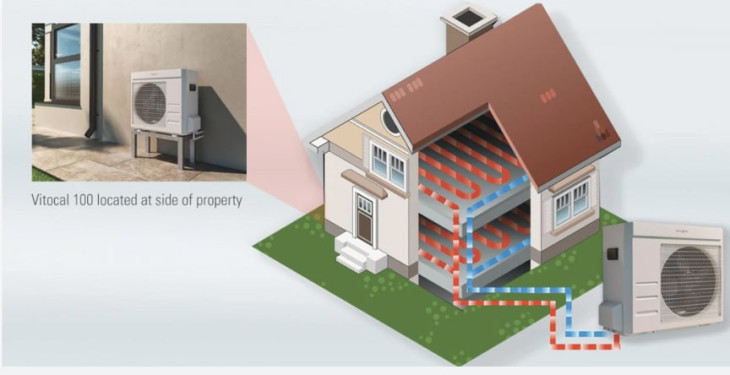
Another type, the ground source heat pump (geothermal), utilises the stable temperature of the ground, capturing heat from beneath the earth's surface.
This type of heat pump is particularly advantageous in terms of efficiency, since ground temperatures are more consistent than air temperatures. Geothermal heat pumps often deliver higher levels of efficiency due to their stable heat source.
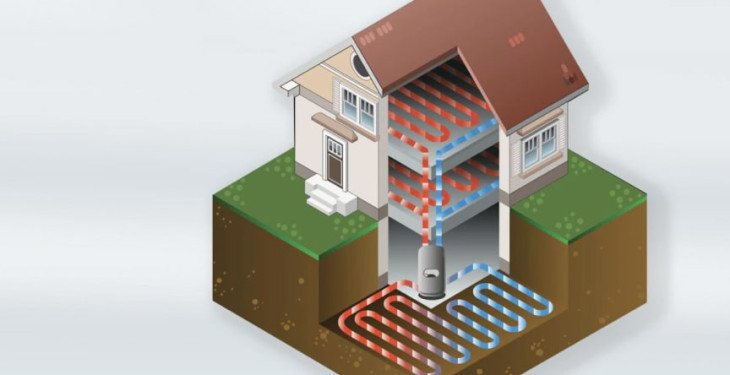
In summary, heat pumps are an effective solution for powering your home's heating and cooling needs, offering a greener and cost-effective alternative to traditional methods.
With various types available, homeowners can choose the one that best suits their unique requirements, comfortably heating their entire house with increased efficiency.
Heat pumps are an energy-efficient alternative to traditional heating systems like furnaces and boilers. They can provide whole house heating and cooling, using electricity to transfer heat between spaces, making the living areas more comfortable.
There are two main types of heat pump systems: ducted and ductless.
Ducted systems utilise a central air-source heat pump connected to a system of ducts and air handlers throughout the home. These systems distribute conditioned air through a series of vents and grilles, providing a consistent temperature in all rooms.
Ducted systems are suitable for homes with an existing ductwork infrastructure or during the construction of a new house.
Ductless systems, also called mini-split heat pumps, comprise an outdoor unit and multiple indoor units, each serving specific areas of the house. These units are connected by refrigerant lines and require no ducts for air distribution.
They offer flexibility in placement and are perfect for homes with limited space, or for homeowners aiming to retrofit a heating and cooling solution.
While heat pumps can efficiently heat and cool your home, they may not always be the sole solution. In colder climates, air-source heat pumps can struggle to provide enough warmth during extremely low temperatures.
In these cases, combining the heat pump with a secondary heating system, offers optimal performance and energy savings.
A hybrid heat pump is an appliance that conjoins a heat pump (often air source) with another method of traditional heating, such as a gas boiler.
The boiler in question could be either a current boiler or you could upgrade to a new boiler as part of the installation.

These hybrid systems help to maintain a comfortable indoor environment while keeping energy bills in check.
Remember, selecting the right type of heat pump and integrating it with other systems, if necessary, are crucial steps to enjoy an energy-efficient, cost-effective, and comfortable whole-house heating solution.
Heat pumps are highly efficient systems known for saving energy and subsequently lowering household running costs.
Compared to traditional heating methods, such as furnaces and boilers, heat pumps offer a greater level of efficiency due to their ability to transfer heat from a cool space to a warm space.
When combined with proper home insulation, air sealing, and weatherization, homeowners can experience even more significant reductions in energy consumption.
A key feature of heat pump systems is their reliance on electricity rather than fossil fuels, like natural gas.
This allows for more environmentally-friendly heating and helps to reduce carbon emissions. Furthermore, several government schemes and initiatives provide incentives for installing heat pumps, such as tax credits, rebates, and other energy discounts.
Heat pumps contribute to a greener and cleaner energy outlook, benefiting the environment in several ways. By not relying on fossil fuels, they actively help to diminish carbon emissions and lower the carbon footprint of a household.
This clean energy approach bolsters efforts to combat climate change and protect Earth's finite resources.
Additionally, the refrigerant line used in heat pump systems has progressively developed to become more environmentally friendly over time. Modern refrigerants minimise negative impact on the ozone layer and contribute to a sustainable future.
When considering a heat pump as a heating solution for your whole house, initial costs must be taken into account. Installing a heat pump can range from anywhere between £2,000 and £20,000, with the average homeowner spending around £4,000.
Factors such as the type of heat pump, the size of your home, and local climate will influence the overall cost. It's essential to research the specific type of heat pump and find out if an air-to-air system or geothermal heat pump would be more suitable for your needs and budget.
Maintaining your heat pump system is an essential aspect of prolonging its lifespan and ensuring efficiency. Regular maintenance includes cleaning filters, inspecting outdoor units, and checking refrigerant levels.
The average annual cost of maintenance varies widely, generally between £100 and £300, based on your HVAC system and local climate. A properly maintained heat pump can last up to 20 years. However, factors such as frequency of use, heating season duration, and baseboard heater usage can impact the lifespan of the system.
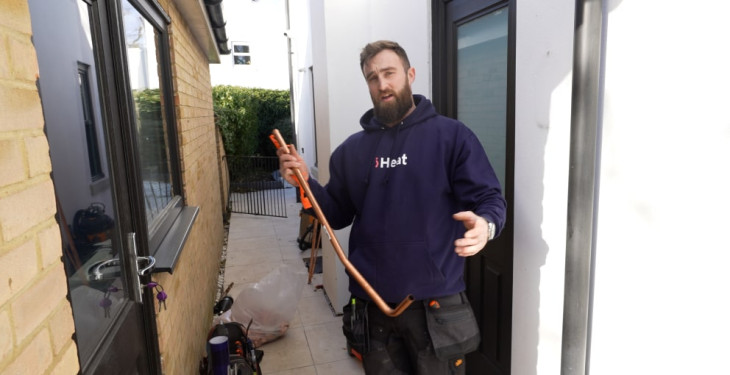
The Boiler Upgrade Scheme (BUS) supports the installation of heat pumps and biomass boilers in England and Wales. It provides upfront capital grants, including £5000 for air source heat pumps, £5000 for biomass boilers, and £6000 for ground source heat pumps.
With £450 million of grant funding available over three years (2022-2025), the scheme aims to decarbonise heat in buildings and promote sustainable heating solutions.
By reducing costs and encouraging the adoption of renewable technologies, the BUS contributes to lower emissions and a greener future for homes and non-domestic buildings.
In summary, installing a heat pump to heat your entire home can be a significant financial investment. It requires researching the best type of heat pump, considering the costs of installation, maintenance, and lifespan, along with potential subsidies and incentives.
Keeping all these factors in mind will ensure that you make a confident, knowledgeable decision when selecting the right heating solution for your home.
When considering a heat pump to heat your entire house, it is essential to select the appropriate system. This section will discuss vital aspects that need consideration during the selection process, including sizing and types of heat pump systems.
Proper sizing of a heat pump system is crucial for efficient heating performance. An oversized or undersized system can lead to both increased energy consumption and reduced comfort.
To determine the right size, consult an HVAC technician who will assess your home, insulation, and other factors to calculate the heat load.
It is essential to avoid choosing an oversized heat pump, as it may short-cycle, compromise efficiency, and wear out faster. At the same time, an undersized system may struggle to maintain a comfortable temperature during extreme weather, leading to higher energy costs and frequent repairs.
There are various types of heat pump systems, each with different advantages and limitations. Some common types include:
These systems transfer heat between indoor and outdoor air. They are the most common type and can provide significant energy savings compared to traditional heating systems.
Instead of transferring heat between the air, these systems transfer heat to water. They are often used in homes with a water-based distribution system, such as radiators or underfloor Heating.
Also known as geothermal heat pumps, these systems draw heat from the ground or underground water sources. They offer higher efficiency but have higher installation and maintenance costs
These systems transfer heat from water sources such as lakes, rivers, or wells. They are a suitable option if a reliable water source is nearby, offering efficiency and reduced environmental impact.
When choosing a system type, it's important to consider factors such as installation and maintenance costs, distribution requirements, and the availability of energy sources such as propane or electricity.
Another aspect to take into account is whether to install a ductless version, such as mini-splits. These systems allow zoning and individual temperature control for different rooms, providing flexibility and increased efficiency.
However, they may require more maintenance and may not suit houses requiring a centralised distribution system.
Selecting the appropriate heat pump system is crucial for heating your entire house efficiently. Carefully consider sizing requirements and consult with an HVAC technician to ensure your chosen system type is suited to your home's needs, energy sources, and distribution preferences.
To calculate the size of the pump needed for heating, you should consider factors like the heat demand of the home, the size of the area to be heated, and the required water flow rate. The total heat demand can be calculated by determining the heat load of your property, which is based on its size, insulation, and heating requirements. A heating professional can help with a precise calculation for optimal efficiency.
To determine the size of the heat pump, you need to calculate the heating load of your property. This involves assessing the area to be heated, the insulation quality, and external temperatures. An energy audit or manual calculation is typically done using the heat demand (measured in kW) based on these factors. It's always best to consult with a professional to get an accurate estimate.
The number of kW you need for a heat pump depends on the size of your home, insulation, and the climate in your area. A general estimate for a typical home might range from 6 kW to 12 kW, but it is important to calculate the exact heat demand for your property. A professional installer can help determine the right capacity for your system based on specific needs.
It is generally better to avoid both undersizing and oversizing a heat pump. Undersizing can lead to inadequate heating, while oversizing can reduce efficiency and cause the system to cycle on and off too frequently. A properly sized heat pump, tailored to your home’s specific needs, will be the most efficient and cost-effective choice.
The general rule of thumb for heat pump sizing is to calculate the heating load of the home, taking into account factors like square footage, insulation, and outdoor temperatures. A common estimate is 1 kW of heat pump capacity for every 10-15 square meters of well-insulated living space. However, it’s important to consult with a professional to get a more accurate calculation based on your specific home and climate.
An oversized heat pump can result in inefficient operation. It may heat the space too quickly, causing the system to cycle on and off frequently, which wastes energy. Oversized units can also lead to higher installation costs and a shorter lifespan due to excessive wear on components. Proper sizing is key to achieving efficiency and reliability.
If a heat pump is too big, it can cause short cycling, where the system turns on and off frequently. This reduces efficiency, increases wear and tear, and may lead to higher energy bills. The system also won’t have time to remove moisture from the air, which can affect comfort levels. Proper sizing is essential to ensure the heat pump runs efficiently and effectively.


01st October, 2025
Choose the best boiler brand for your home with the iHeat easy guide.
 Read Article
Read Article
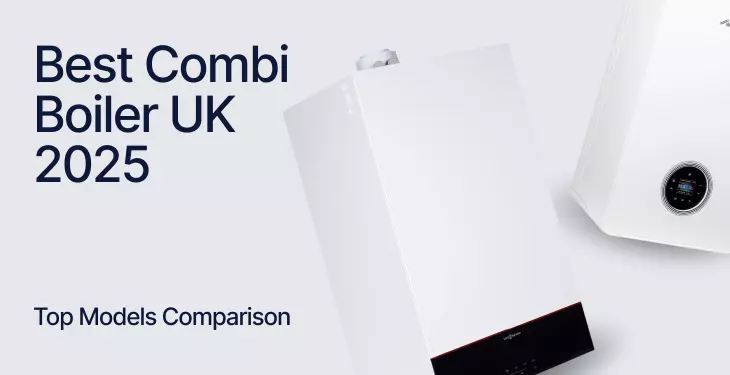
01st October, 2025
Here’s a quick roundup of the best combi boilers for 2025.
 Read Article
Read Article
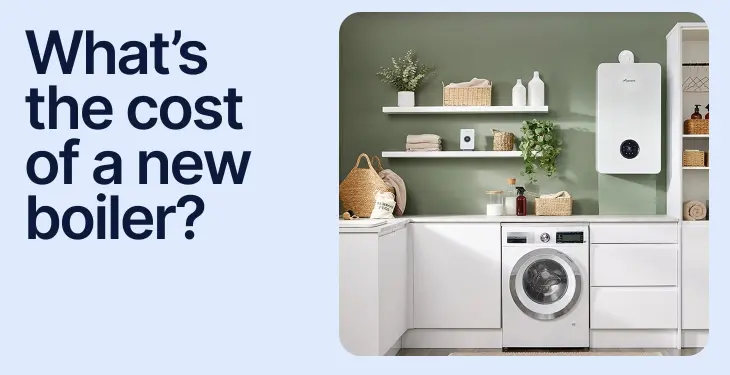
01st October, 2025
New boiler cost can be a baffling topic, but our iHeat expert guide will clear things up!
 Read Article
Read Article